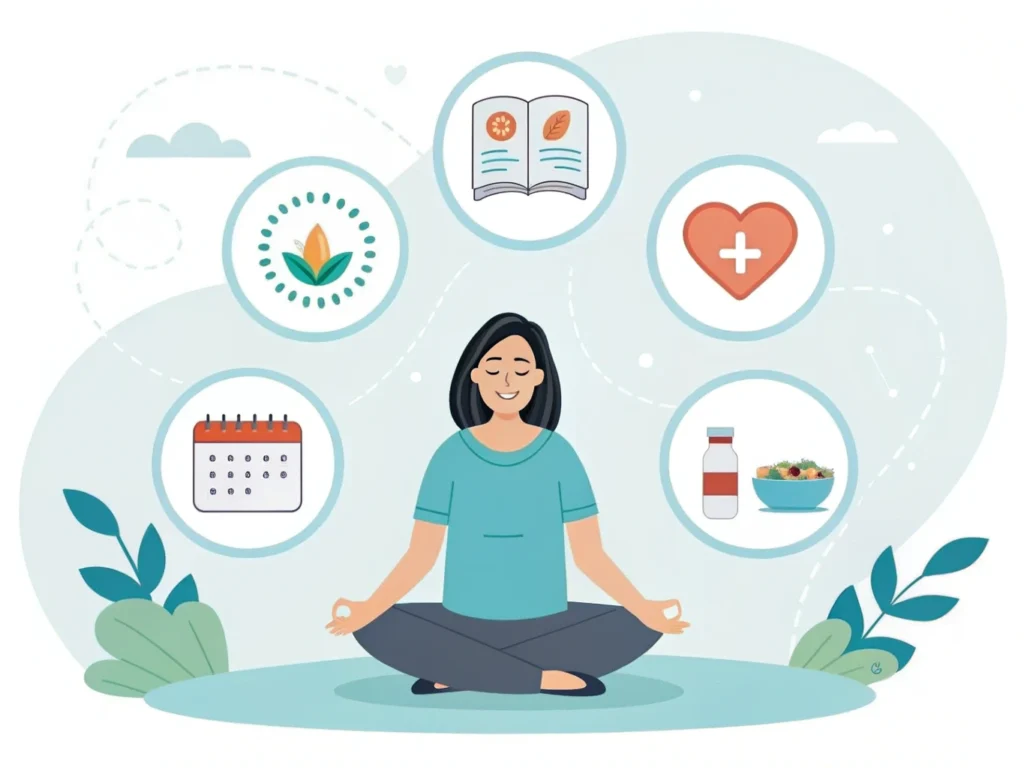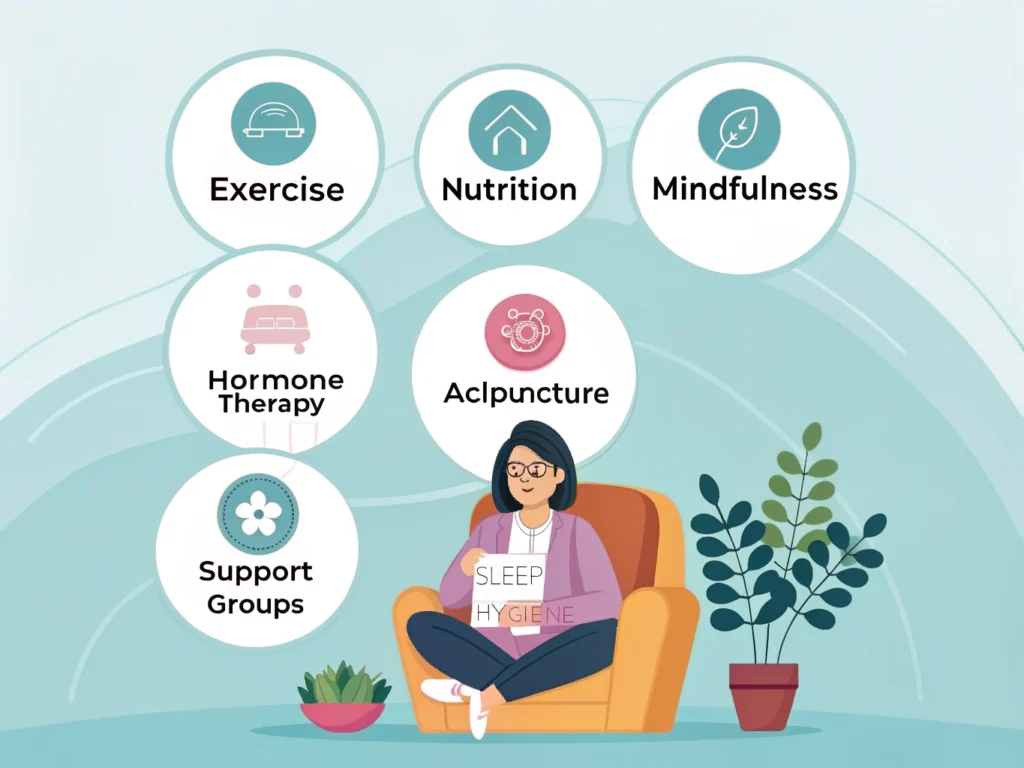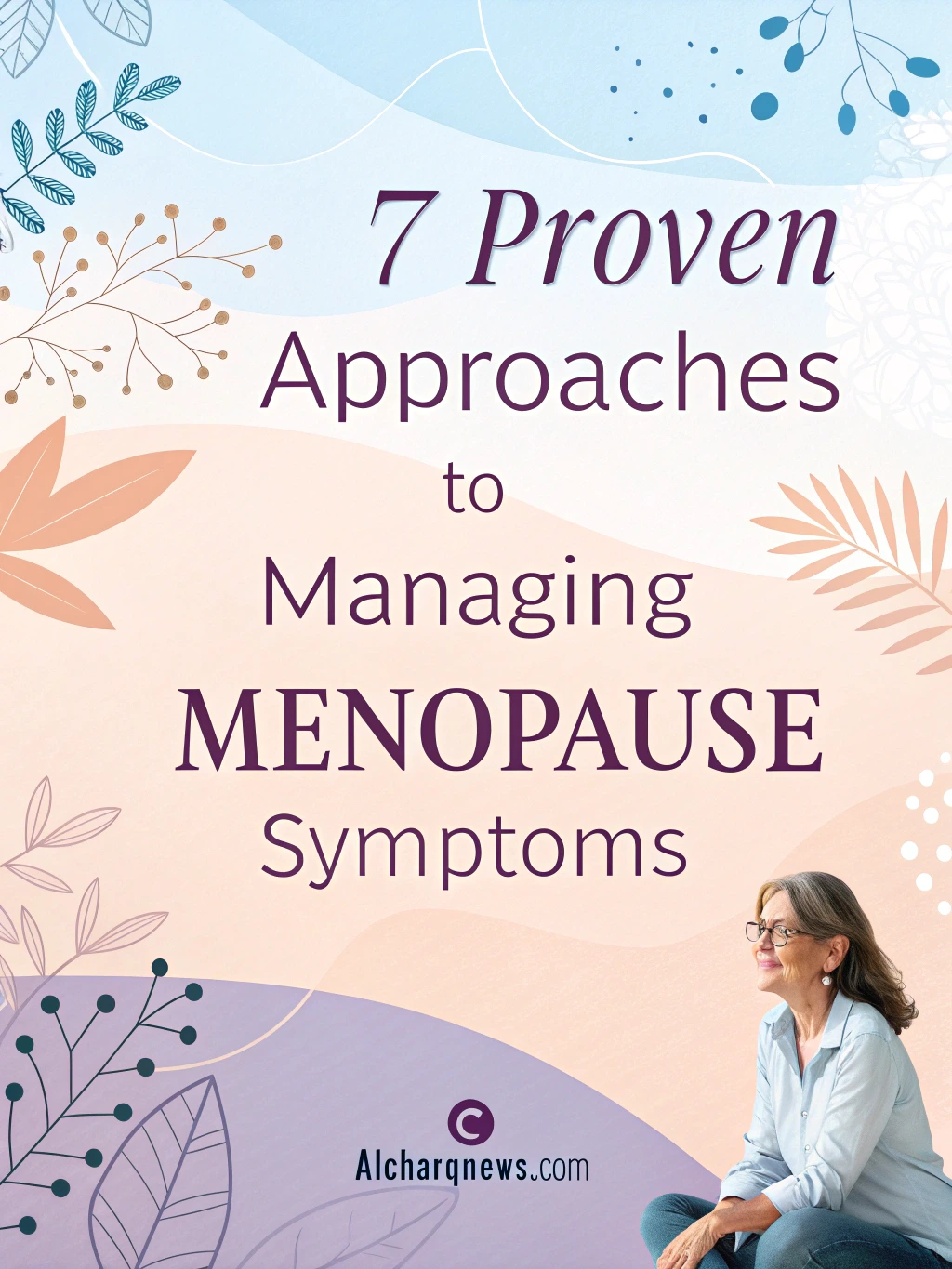Every night, I would wake up drenched in sweat, sheets soaked, heart racing. The hot flashes that came with menopause weren’t just uncomfortable—they were disrupting my life. Perhaps you’ve experienced something similar, or maybe you’re dealing with mood swings, insomnia, or other menopause symptoms that make daily life challenging. You’re not alone. Millions of women worldwide navigate this significant life transition, often feeling overwhelmed by the changes happening in their bodies.
While hormone replacement therapy works for some, many women seek natural alternatives to manage menopause symptoms. This comprehensive guide explores seven evidence-backed natural approaches that can help you regain control and find relief during this transformative time.
Table of contents

Understanding Menopause: More Than Just Hot Flashes
What Is Menopause?
Menopause marks the permanent cessation of menstruation—a natural biological process signaling the end of your reproductive years. In the United States, women typically experience menopause around age 51, though this can vary considerably. This transition doesn’t happen overnight but occurs across three distinct phases:
- Perimenopause: The transitional years before menopause (typically beginning in your 40s) when hormone levels fluctuate and early symptoms may appear
- Menopause: Officially begins after 12 consecutive months without a menstrual period
- Postmenopause: The years following menopause, when symptoms often gradually subside
Common Menopause Symptoms
The declining estrogen levels during menopause can trigger numerous physical and emotional changes. While each woman’s experience differs, common symptoms include:
- Hot flashes and night sweats that can disrupt daily activities
- Sleep disturbances, including difficulty falling or staying asleep
- Mood fluctuations, including irritability, anxiety, and low mood
- Vaginal dryness and associated discomfort during intimacy
- Changes in weight distribution, particularly increased abdominal fat
- Cognitive changes often described as “brain fog” or memory lapses
- Decreased bone density, raising osteoporosis risk
Why Consider Natural Approaches to Menopause?
Many women gravitate toward natural management strategies for several compelling reasons:
- They offer gentle, sustainable symptom relief without pharmaceutical side effects
- They address multiple symptoms simultaneously through whole-body approaches
- They empower you with personal agency over your health and well-being
- They often bring additional health benefits beyond symptom management
- They can complement conventional treatments when appropriate
7 Natural Approaches to Managing Menopause
1. Nutrition: Eating for Hormonal Balance
Your dietary choices wield remarkable influence over how intensely you experience menopause symptoms. Research consistently shows that certain eating patterns can either exacerbate or alleviate common complaints.
The Menopause Diet Framework
Consider adopting an anti-inflammatory eating pattern focused on whole, minimally processed foods. Mediterranean-style diets have shown particular promise for menopause symptom management. Meanwhile, be mindful that certain dietary elements—including alcohol, caffeine, and spicy foods—frequently trigger hot flashes in susceptible women.
Particular attention to calcium and vitamin D becomes crucial during this life stage, as declining estrogen accelerates bone mineral loss. Aim for 1,200mg of calcium and 600-800 IU of vitamin D daily through diet or supplements as recommended by your healthcare provider.
Key Foods That Help Manage Menopause Symptoms
| Food Group | Benefits | Examples |
|---|---|---|
| Phytoestrogen-rich foods | May help balance hormones and reduce hot flash frequency | Organic soy products, ground flaxseeds, chickpeas, lentils |
| Omega-3 fatty acids | Support heart and brain health; may improve mood stability | Wild-caught salmon, sardines, walnuts, chia seeds |
| Calcium-rich foods | Promote bone health and reduce fracture risk | Plain yogurt, sardines with bones, kale, fortified plant milks |
| Cooling foods | May reduce hot flash intensity and frequency | Cucumbers, watermelon, celery, mint |

Hydration and Menopause
Never underestimate the importance of adequate fluid intake during menopause. Dehydration can intensify hot flashes, worsen vaginal dryness, and compromise cognitive function. Aim for at least eight 8-oz glasses of water daily, adjusting upward during exercise or hot weather.
Certain herbal teas offer particular benefits during menopause:
- Rooibos tea provides antioxidant support
- Peppermint tea delivers cooling effects that may ease hot flashes
- Valerian or chamomile tea can support better sleep quality
2. Strategic Exercise for Menopause Relief
Regular physical activity ranks among the most powerful natural approaches for managing menopause symptoms, with benefits extending to virtually every aspect of this transition.
Best Types of Exercise During Menopause
Focus on incorporating these four essential exercise categories:
- Weight-bearing exercises stimulate bone formation and slow mineral loss. Walking, dancing, and stair climbing all qualify as accessible options.
- Cardiovascular exercise improves heart health, supports healthy weight management, and boosts mood through endorphin release. Aim for activities you genuinely enjoy—swimming, cycling, or brisk walking all provide excellent benefits.
- Strength training combats the accelerated muscle loss that accompanies menopause. Even twice-weekly sessions using resistance bands, body weight exercises, or light dumbbells can maintain lean muscle mass.
- Low-impact options protect joints while still delivering cardiovascular and strength benefits. Consider water aerobics, elliptical training, or recumbent cycling if you experience joint discomfort.
The Optimal Exercise Schedule
Rather than focusing exclusively on duration, prioritize consistency in your movement practice. Most women experience optimal benefits with:
- 150 minutes of moderate-intensity aerobic activity weekly (e.g., five 30-minute sessions)
- Two or three strength training sessions targeting major muscle groups
- Daily flexibility exercises, even brief sessions lasting just 5-10 minutes
- Balance-focused movement (like yoga or tai chi) at least twice weekly
Remember that even short activity bursts deliver benefits. If finding 30 consecutive minutes proves challenging, three 10-minute sessions provide comparable advantages.
3. Stress Management and Mindfulness Practices
The relationship between stress and menopause resembles a feedback loop—each element intensifies the other. Breaking this cycle through intentional stress-reduction strategies can dramatically improve your menopause experience.
How Stress Affects Menopause Symptoms
When stress activates your body’s cortisol response, it triggers a cascade of physiological changes that can:
- Increase hot flash frequency and intensity
- Disrupt already fragile sleep patterns
- Exacerbate mood fluctuations
- Compromise cognitive function
- Accelerate bone mineral loss
Effective Mindfulness Techniques for Menopause
Integrating even brief mindfulness practices into your daily routine can yield significant improvements:
- Meditation: Even 5-10 minutes daily can lower stress hormones and improve emotional regulation. Apps like Insight Timer offer free guided meditations specifically for menopause symptoms.
- Breathing exercises: Practice “paced breathing”—six slow, deep breaths per minute—at the first sign of a hot flash to potentially reduce its intensity.
- Progressive muscle relaxation: This systematic tension-and-release technique before bedtime can improve sleep quality and reduce nighttime awakenings.
- Mindful movement: Practices like yoga, tai chi, and qigong combine physical benefits with stress-reduction components, addressing multiple menopause concerns simultaneously.

4. Herbal Supplements with Evidence-Based Benefits
Botanical remedies have supported women through menopause for centuries across diverse cultures. Modern research has begun validating certain traditional options, though results vary considerably among individuals.
Most Researched Herbs for Menopause Relief
| Herb | Primary Benefits | Research Support | Dosage Guidelines |
|---|---|---|---|
| Black cohosh | Hot flashes, night sweats, mood changes | Moderate evidence from multiple clinical trials | 40-80mg standardized extract daily |
| Red clover | Hot flashes, bone health maintenance | Mixed evidence with some positive findings | 40-160mg isoflavones daily |
| Maca root | Hormonal balance, energy, sexual function | Emerging evidence, primarily from smaller studies | 1500-3000mg daily |
| Dong quai | Hot flashes, vaginal dryness | Limited evidence, often used in combination formulas | 300-600mg daily |
Important Safety Considerations
While herbal approaches appeal to many women, proceed with appropriate caution:
- Always discuss supplements with your healthcare provider, especially if you take medications
- Select products from reputable manufacturers who test for purity and potency
- Begin with lower dosages, gradually increasing based on your body’s response
- Monitor for potential side effects, discontinuing use if adverse reactions occur
- Remember that botanical treatments typically require 4-8 weeks before benefits become apparent
5. Acupuncture and Traditional Chinese Medicine
Eastern medicine views menopause through a fundamentally different lens than Western approaches—focusing on energy balance rather than hormone levels. This perspective offers complementary strategies that benefit many women.
How Acupuncture May Help Menopause Symptoms
Research increasingly supports acupuncture’s effectiveness for certain menopause complaints:
- Studies demonstrate significant reductions in hot flash frequency and severity
- Improvements in sleep quality often surpass those seen with placebo treatments
- Mood stabilization benefits emerge in multiple clinical trials
- Pain reduction effects may help with joint discomfort
For optimal results, most practitioners recommend an initial series of 8-12 weekly treatments, followed by maintenance sessions as needed. Many women report noticing improvements after 3-4 sessions.
Beyond Needles: Other TCM Approaches
Traditional Chinese Medicine encompasses numerous modalities beyond acupuncture:
- Chinese herbal formulations tailored to your specific symptom pattern
- Moxibustion (the warming of acupuncture points using mugwort herb)
- Cupping therapy for muscle tension and pain
- Self-acupressure techniques you can perform at home
Consider seeking a licensed practitioner who specializes in women’s health for the most targeted approach to your menopause concerns.
6. Optimizing Sleep During Menopause
Quality sleep becomes both more challenging and more crucial during menopause. Night sweats, hormonal fluctuations, and accompanying anxiety can severely disrupt rest patterns, creating a cycle that worsens daytime symptoms.
Creating the Ideal Sleep Environment
Small adjustments to your sleeping space can yield significant improvements:
- Maintain bedroom temperatures between 60-67°F (15-19°C)
- Select moisture-wicking bedding materials like bamboo or specialized cooling fabrics
- Layer bedding for easy temperature adjustment during the night
- Use blackout curtains to block light that can disrupt melatonin production
- Consider white noise machines to mask disruptive sounds
Menopause-Specific Sleep Hygiene Practices
Beyond environmental factors, behavioral modifications support better sleep:
- Establish consistent sleep and wake times—even on weekends
- Avoid alcohol within three hours of bedtime (it disrupts REM sleep and can trigger night sweats)
- Keep a small, cold water bottle beside your bed for quick cooling during night sweats
- Consider sleeping separately from your partner during particularly difficult periods if their body heat exacerbates your symptoms
- If sleep problems persist despite these measures, discuss sleep evaluation with your healthcare provider, as menopause increases risk for conditions like sleep apnea
7. Mind-Body Therapies and Energy Work
Integrative practices that address both physical and emotional dimensions offer particularly suitable support during menopause, which itself spans physical, emotional, and spiritual aspects of life.
Yoga for Menopause
Certain yoga practices have demonstrated specific benefits for menopausal women:
- Restorative poses like Supported Bridge reduce hot flash intensity by activating the parasympathetic nervous system
- Forward bends have cooling effects beneficial during hot moments
- Specific sequences can target hormone-regulating energy centers
- Pranayama (breathing techniques) provides tools for managing acute symptoms
Look for classes specifically designed for menopause or “women’s wisdom” if available in your area, or explore online programs created for midlife women.
Other Beneficial Mind-Body Approaches
Beyond yoga, numerous modalities offer support:
- Tai Chi improves balance and bone density while reducing stress
- Qigong practices enhance energy flow and emotional equilibrium
- Reflexology sessions focused on endocrine points may help balance hormonal symptoms
- Aromatherapy with essential oils like clary sage, peppermint, or lavender can provide in-the-moment relief from specific symptoms
Creating Your Personalized Menopause Management Plan
The most effective approach to menopause combines multiple strategies tailored to your specific symptoms, preferences, and lifestyle.
Tracking Your Symptoms
Begin by establishing a clear baseline of your experience:
- Document symptom frequency, intensity, and timing for at least two weeks
- Note potential triggers like certain foods, stressful events, or environmental factors
- Use specialized apps like MenoPro or Clue, or create a simple journal
- Share this information with healthcare providers to inform your collaborative care plan
Combining Approaches for Maximum Benefit
Rather than implementing all seven strategies simultaneously, consider phasing them in gradually:
- Start with foundational nutrition changes and basic stress management techniques
- Add targeted exercise appropriate for your fitness level
- Incorporate additional modalities based on your most problematic symptoms
- Allow 4-6 weeks between adjustments to accurately assess effects
When to Consult Healthcare Providers
While natural approaches offer substantial benefits, certain situations warrant professional medical attention:
- Extremely heavy or irregular bleeding during perimenopause
- Severe depression or anxiety that interferes with daily functioning
- Heart palpitations or chest pain
- Symptoms that remain debilitating despite self-care measures
Remember that integrative care—combining conventional and natural approaches—often provides the most comprehensive relief.

Conclusion: Embracing Menopause as a Natural Transition
Menopause isn’t just an ending—it’s a beginning. By implementing these seven natural approaches, you can navigate this transition with greater ease and even discover new strengths along the way. Remember that every woman’s menopause journey unfolds uniquely, and finding what works for you may require patience and experimentation.
The strategies outlined here offer starting points for creating your personalized path to menopause relief. As you incorporate these natural approaches into your daily routine, pay attention to how your body responds. Adjust as needed, celebrate improvements, and extend compassion to yourself throughout the process.
With thoughtful self-care and the right support, menopause can transform from a challenging medical experience into an opportunity for renewed well-being and personal growth. This natural transition, while sometimes difficult, can also open doors to increased self-awareness, deeper wisdom, and a powerful new chapter in your life journey.
Frequently Asked Questions About Managing Menopause Naturally
How long do menopause symptoms typically last?
Menopause symptoms vary tremendously among women. While the average duration spans 4-7 years, some women experience symptoms for just a few months, while others navigate them for a decade or more. Generally, both frequency and intensity decrease gradually over time for most women experiencing menopause.
Can diet really make a difference in menopause symptoms?
Absolutely. Research consistently demonstrates that dietary choices significantly impact menopause symptoms. Foods rich in phytoestrogens may help balance hormonal fluctuations, while common triggers like spicy foods, alcohol, and caffeine frequently intensify hot flashes during menopause.
Is it too late to start exercising during menopause?
It’s never too late to begin moving your body, and menopause actually represents an ideal time to establish consistent physical activity habits. Exercise during menopause helps manage weight changes, improves mood stability, strengthens bones, and reduces heart disease risk—all crucial benefits during this transition.
How do I know if herbal supplements for menopause are safe?
Before incorporating any herbal supplement into your menopause management plan, consult with a knowledgeable healthcare provider, especially if you take medications or have existing health conditions. Choose products from manufacturers who voluntarily submit to third-party testing, start with conservative dosages, and monitor your response carefully over several weeks.
Can stress really make menopause symptoms worse?
Unquestionably. Stress triggers cortisol release, which can disrupt already-fluctuating hormone levels and exacerbate numerous menopause symptoms, particularly hot flashes and sleep disturbances. This physiological connection explains why stress management forms a crucial component of effective natural menopause management.
Do I still need to see my doctor if I’m managing menopause naturally?
Regular medical care remains essential during menopause. Your healthcare provider can monitor overall health, conduct important screenings like bone density tests and mammograms, and ensure that your natural approaches work effectively and safely. Consider finding a provider who supports integrative care for optimal results.
What’s the difference between perimenopause and menopause?
Perimenopause describes the transitional years preceding menopause when hormone levels begin fluctuating significantly and early symptoms may emerge. Menopause officially begins after 12 consecutive months without menstruation. Both stages benefit from the natural management approaches discussed throughout this article.

